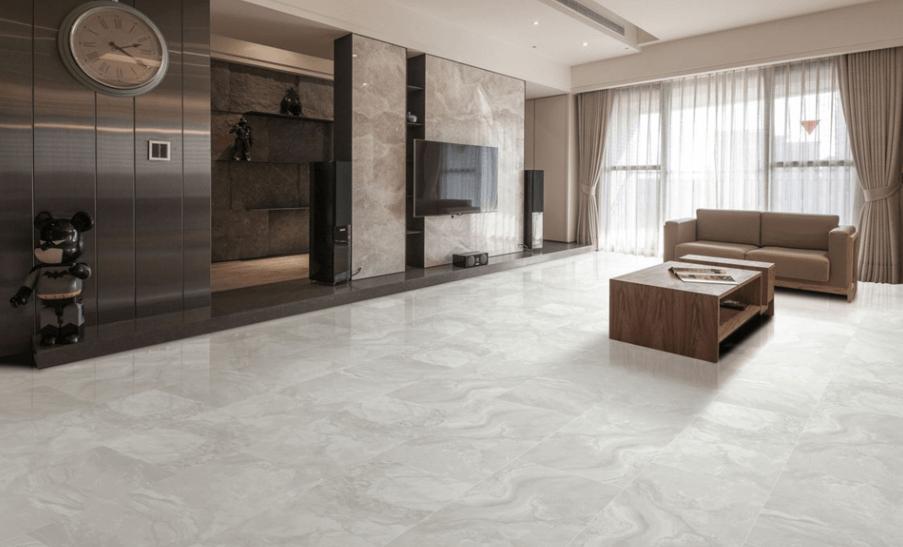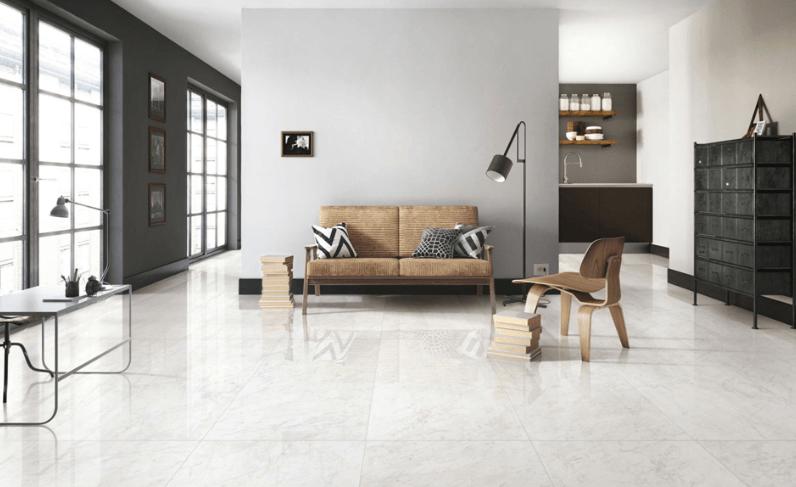Marble tile is a luxurious and timeless choice for flooring, countertops, and other surfaces. It's elegance and natural beauty can enhance the aesthetics of any space. However, like any other material, marble is not immune to damage.
One common concern among homeowners and designers is whether marble tile chips easily. In this article, we will explore the factors that contribute to marble tile chipping, provide tips on prevention, and discuss restoration methods to bring back the tile's original splendor.
One common concern among homeowners and designers is whether marble tile chips easily. In this article, we will explore the factors that contribute to marble tile chipping, provide tips on prevention, and discuss restoration methods to bring back the tile's original splendor.
Does Marble Tile Chip Easily?
Generally speaking, the marble tile can withstand the wear and tear. However, if you buy low-quality marble tile or make the marble tile encounter some things, the marble tile would chip easily. The likelihood of marble tile chipping depends on the following factors:
Impact: Marble tile can chip if it is subjected to a significant impact or force. Dropping heavy objects or accidentally hitting the tile with a hard object can potentially cause chips or fractures.
●Sharp Objects: Scratching or scraping marble tile with sharp objects like knives or metal utensils can create chips or small nicks on the surface.
●Installation: Improper installation techniques, such as inadequate adhesive or improper tile cutting, can weaken the tile's integrity, making it more prone to chipping.
●Grout Joints: The grout joints surrounding marble tiles can also impact their vulnerability to chipping. If the grout lines are not properly sealed or maintained, they can become a weak point where chips may occur.
Impact: Marble tile can chip if it is subjected to a significant impact or force. Dropping heavy objects or accidentally hitting the tile with a hard object can potentially cause chips or fractures.
●Sharp Objects: Scratching or scraping marble tile with sharp objects like knives or metal utensils can create chips or small nicks on the surface.
●Installation: Improper installation techniques, such as inadequate adhesive or improper tile cutting, can weaken the tile's integrity, making it more prone to chipping.
●Grout Joints: The grout joints surrounding marble tiles can also impact their vulnerability to chipping. If the grout lines are not properly sealed or maintained, they can become a weak point where chips may occur.
What Causes Marble to Chip?
In this section, the author would give a further analysis of what causes your marble tiles to chip.
●In ferior Quality
Generally speaking, marble stone is a natural stone that is formed by the earth's activity. And, the marble stone usually is extremely durable. However, some suppliers would sell bad marble tiles(e.g. the tiles already have hairline cracks) to seek more money. Therefore, it is very important to find a reliable and trusted marble company to get the right tile.
●The Improper Curing of the Concrete
Before installing marble tile, it is required to ensure the proper and correct drying and curing. The concrete used for fixing the marble tile has high water content when it dries, it shrinks and moves. Therefore, if the worker installs the marble tile before the full-curing of the concrete, the concrete would crack and break when it dries. As the house owner, you should check whether the concrete is fully cured. In general, the concrete has been left to dry for at least 28 days after pouring.
●The Cured Concrete Cracked or Moved
Over time, cured concrete is prone to cracking and shifting. It is a natural occurrence for older concrete substrates to develop a few cracks. However, these cracks and movements in the concrete can exert stress on marble stone tiles, resulting in hairline cracks, larger fractures, or even tile breakage.
When faced with such a situation, the recommended course of action is to remove the cracked tiles entirely. This involves carefully removing the damaged marble tiles and preparing the substrate for a fresh installation. To mitigate the impact of concrete movement and stress on the new tiles, it is advisable to install a crack isolation membrane.
When faced with such a situation, the recommended course of action is to remove the cracked tiles entirely. This involves carefully removing the damaged marble tiles and preparing the substrate for a fresh installation. To mitigate the impact of concrete movement and stress on the new tiles, it is advisable to install a crack isolation membrane.
●The Wrong-Sealed Grout Joints
When concrete floors have control joints, it is probable that the marble tiles spanning over them will experience cracking. These joints in the concrete are crucial for averting cracks and accommodating concrete movement as time passes.
It is preferable to have a few cracked marble tiles than a cracked concrete substrate, as the latter can potentially inflict more harm on your marble floors in the future.
The sole remedy is to replace the cracked tiles from the control joints as necessary.
It is preferable to have a few cracked marble tiles than a cracked concrete substrate, as the latter can potentially inflict more harm on your marble floors in the future.
The sole remedy is to replace the cracked tiles from the control joints as necessary.

How to Prevent the Marble Tile from Chip?
In the previous content, the author has listed some solutions to prevent the marble tile from chip. And, in this section, the author would give complete guidance to teach you to prevent the marble tile from chip.
To prevent marble tiles from chipping, there are several measures you can take:
To prevent marble tiles from chipping, there are several measures you can take:
●Proper installation
Ensure that the tiles are installed correctly by hiring a professional or following proper guidelines. Improper installation can increase the risk of chipping.
●Use the right adhesive
Choose a high-quality adhesive specifically designed for square marble tile. The adhesive should provide sufficient bonding strength and flexibility to minimize the chances of tiles chipping.
●Prepare the surface
Before installing the tiles, make sure the surface is clean, level, and free of any debris or protrusions. Uneven surfaces can lead to stress points on the tiles, making them more prone to chipping.
●Use appropriate tools
When cutting or drilling marble tile backsplash, use tools specifically designed for stone materials. Using improper or dull tools can cause unnecessary stress on the tiles and increase the risk of chipping.
●Handle with care
Marble tiles are delicate and can chip easily if mishandled. Avoid dropping heavy objects or dragging furniture across the floor. Use furniture pads or protective mats to minimize the impact and abrasion on the tiles.
●Apply sealant
Apply a high-quality sealant to the surface of the marble tiles. Sealants help protect the tiles from moisture, stains, and minor impacts, reducing the chances of chipping.
●Regular maintenance
Clean the marble tiles regularly using non-abrasive cleaners and soft tools. Avoid using harsh chemicals or abrasive materials that can damage the surface and make the tiles more susceptible to chipping.
By following these preventative measures and maintaining the marble tiles properly, you can significantly reduce the risk of chipping and prolong their lifespan.
By following these preventative measures and maintaining the marble tiles properly, you can significantly reduce the risk of chipping and prolong their lifespan.
How Do You Restore Chipped Marble?
If your natural marble tiles have chipped, you may wonder how to restore it? Then, in this section, the author would give you a solution to help you restore the chipped marble tiles.
●Clean the area
Start by thoroughly cleaning the chipped area of the marble. Use a mild detergent or stone cleaner and a soft cloth to remove any dirt, debris, or residue from the surface. Rinse the area with clean water and allow it to dry completely.
●Collect marble dust or chips
If you have any leftover marble dust or chips from the original installation, collect them. Alternatively, you can purchase a marble repair kit that includes matching color pigments.
●Prepare the repair mixture
Mix the collected marble dust or chips with a marble epoxy or resin-based adhesive according to the manufacturer's instructions. Gradually add the marble dust or chips to the adhesive until you achieve a paste-like consistency.
●Apply the repair mixture
Using a putty knife or a small spatula, carefully apply the repair mixture to the chipped area. Fill the chip completely, ensuring that the mixture is level with the surrounding marble surface. Smooth out the surface of the repair mixture with the putty knife or spatula.
●Allow curing time
Let the repair mixture cure according to the manufacturer's instructions. This usually takes several hours or overnight. Avoid touching or placing any objects on the repaired area during the curing process.
●Sand and polish
Once the repair mixture has fully cured, use fine-grit sandpaper or a sanding block to carefully smooth the repaired area. Start with a coarser grit and gradually move to finer grits for a polished finish. Be gentle to avoid damaging the surrounding marble.
●Clean and seal
After sanding, clean the restored area with a mild detergent or stone cleaner and rinse thoroughly. Once dry, apply a marble sealant to protect the repaired area and the entire marble surface. Follow the instructions on the sealant for proper application and curing time.
Conclusion
While marble tile is known for its beauty and durability, it is not immune to chipping. Understanding the factors that cause chipping and implementing preventive measures is essential for preserving the integrity of marble tile surfaces. By following proper maintenance practices and taking necessary precautions, homeowners can minimize the risk of chips and cracks.

